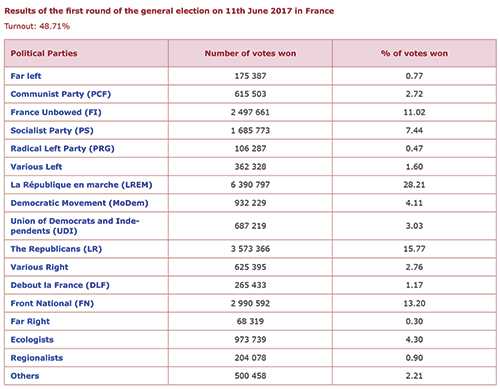Results
Elections in Europe
Corinne Deloy
-

Available versions :
EN

Corinne Deloy
La République en Marche (LREM), the new party formed by the President of the Republic Emmanuel Macron and led by Catherine Barbaroux, easily drew ahead in the first round of the general election on 11th June in France with 28.21% of the vote. Its ally, the Democratic Movement (MoDem) chaired by Justice Minister François Bayrou, won 4.11% of the vote. LREM drew ahead of the Republicans (LR) led by Bernard Accoyer, which won 15.77% of the vote. Their partners in the Union of Democrats and Independents (UDI), a centrist party led by Jean-Christophe Lagarde, won 3.03% of the vote. "Emmanuel Macron and his movement are following a strategy of hegemonic domination" repeated François Baroin, the leader of LR in this general election and during the electoral campaign. No one listened to him however.
The Front National (FN), a populist party led by Marine Le Pen, came third and lost all hope of becoming the main opposition party to Emmanuel Macron. It won 13.2% of the vote. France Unbowed (FI) led by Jean-Luc Mélenchon, which came fourth with 11.02% of the vote. Both populist leaders did not succeed in achieving for their respective parties a result equivalent to that won in the first round of the presidential election on 23rd April last (21.53% and 19.64% of the vote respectively).
For the Socialist Party (PS), led by Jean-Christophe Cambadélis, it was total defeat. The PS, which in 2012, reigned supreme over French political life (Presidency of the Republic, a majority in Parliament, in the regions, the departments and the town halls) won 7.44% of the vote. Its future now hangs in the balance.
An extremely low turnout was the other striking feature of this, the first round of the general elections on 11th June: fewer than half of the electorate (48.71%, - 8.51 in comparison with the first round of the general election on 10th and 17th June 2012) went to vote, i.e. the lowest turnout since the beginning of the V Republic in 1958, and more widely in the country's entire history.
 Source: French Home Affairs Ministry http://elections.interieur.gouv.fr/legislatives-2017/FE.html
Source: French Home Affairs Ministry http://elections.interieur.gouv.fr/legislatives-2017/FE.html
Once again the institutional rationale was respected and the French confirmed in the first round of the general election their vote of the presidential election offering the new head of State the majority he needs to govern.
A yellow wave was expected (LREM's colour), but it was a true tidal wave. Voters largely gave their vote to candidates who were still unknown to the man in the street just a few weeks ago (we recall that 40% of the outgoing MPs were not standing again) and this has pushed many senior members of political life towards the exit door. Personalities on the left in office over the last five years were the most in number to fall victim to what is now being called 'dégagisme' (clearing out), the rejection of the professional politicians, finding themselves eliminated in the first round: the leader of the PS Jean-Christophe Cambadélis; the unfortunate candidate of the PS in the presidential election on 23rd April and 7th May last (6.35% of the vote), Benoît Hamon; the former socialist ministers Matthias Fekl (2014-2017) and Aurélie Filippetti (2012-2014) and the ecologists Emmanuelle Cosse (2016-2017) and Cécile Duflot (2012-2014), not forgetting the former special advisor to the President of the Republic, Nicolas Sarkozy (2007-2012) Henri Guaino (LR), and outgoing MP. Many others are due to follow suit in the second round on 18th June.
Indeed the centrist positioning of LREM provides it with major reserves of votes. In the second round its candidates should benefit from the transfer of votes on the part of supporters on the left, whilst they were against right wing candidates and the transfer of votes on the part of those close to the right, when they were against left wing candidates.
LREM's success in the first round of the general election, a political party created just one year ago, is undeniable even though it has to be relativized given the low turn-out, a mark of electoral fatigue and a feeling on the part of many French citizens that everything is decided in the presidential election, but also a sign of deep division in French society (we recall that one voter in two - 49.99% - chose a populist candidate in the first round of the presidential election on 23rd April last. This victory owes a great deal to the talent of the forces who have rallied around Emmanuel Macron, but it can also be explained by the weakness of their rivals, notably the political parties, both on the right and the left, which have dominated French political life over the most recent decades.
Even though a certain amount of re-balancing might take place in the second round of the election LREM is due to win an absolute majority in the National Assembly, the lower house of the French parliament on 18th June next and enjoy the necessary majority to implement its programme and push through its reforms.
Only 4 MPs were elected in the first round out of 577 seats
On the same theme
To go further
Elections in Europe
Corinne Deloy
—
15 April 2025
Elections in Europe
Corinne Deloy
—
25 February 2025
Elections in Europe
Corinne Deloy
—
18 February 2025
Elections in Europe
Corinne Deloy
—
28 January 2025

The Letter
Schuman
European news of the week
Unique in its genre, with its 200,000 subscribers and its editions in 6 languages (French, English, German, Spanish, Polish and Ukrainian), it has brought to you, for 15 years, a summary of European news, more needed now than ever
Versions :



